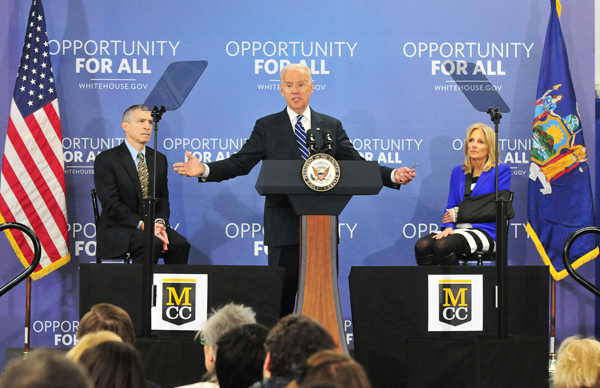Vice President Biden Visits Monroe Community College
•
Vice President Joe Biden speaks about the critical role community colleges play in filling high-demand jobs during his visit to Monroe Community College’s Applied Technologies Center in Rochester, N.Y., on Jan. 29. Joining him on stage were Mike Mandina, president of Optimax Systems and MCC alumnus, and Dr. Jill Biden, who teaches at Northern Virginia Community College (Annandale, Va.). Photo by Monroe Community College/Vasiliy Baziuk.
Employers across the greater Rochester, New York region simply cannot find enough workers to fill jobs in high-demand fields such as health care, advanced manufacturing, optics, information technology and skilled trades. These are middle-skill jobs―jobs that require more than a high school diploma but less than a bachelor’s degree. And they pay a sustaining wage, a critical factor in the Opportunity Index. The situation in Rochester captures the skills gap affecting regional and national economic growth and individual economic well-being.
In his 2014 State of the Union address, President Obama acknowledged this growing gap between the skills workers have and the skills employers need. He tasked Vice President Joe Biden with reforming America’s job-training programs and promoting partnerships between community colleges and businesses to improve the economy and individual lives. Accompanied by his wife, Northern Virginia Community College professor Dr. Jill Biden, the vice president made Monroe Community College’s Applied Technologies Center his first stop on January 29th, the day after the State of the Union address.
The Bidens toured our precision machining lab and met with some of our dedicated and talented students, faculty and staff. They saw firsthand the cutting-edge training that takes place at Monroe Community College.
“Monroe is doing exactly what we need to do to replicate around this country,” said Dr. Biden. “First asking the businesses in the communities what they’re looking for, then designing a program and enrolling students.”
Speaking before an audience of about 500 MCC students and faculty, and community leaders, Vice President Biden held up MCC as a model for meaningful collaborations with employers and for job-training programs that align with future employment opportunities.
“Jill says the best-kept secret in America is the community college system—and it really is,” Vice President Biden said. “By 2020, it’s estimated there will be a need for an additional 870,000 skilled workers for high-tech manufacturing. … We’re talking long-term careers. We’re talking the new manufacturing of the 21st century and new talents that are needed that will not go away for another 30 years.”
Among the MCC initiatives that Vice President Biden highlighted:
- An accelerated precision tooling certificate program in which students earn the full credential in half the time. Graduates receive job placement assistance and have the opportunity to continue their education toward an associate degree in machining. Developed in conjunction with the Rochester Technology and Manufacturing Association, this program nearly doubles the number of graduates and connects them to high-tech careers, building opportunities for social and economic mobility.
- Summer Optics Sizzler, a weeklong program in which high school students design experiments under the guidance of optics professionals and educators and tour local optics companies. The program offers young people and their parents a chance to discover a new and growing career pathway.
- MCC Career Coach, a free web-based, career-exploration tool that provides up-to-date local employment data matching current and future career opportunities with education and training. It lets students know—in advance—what they will earn for what they learn.
At MCC, we know that economic opportunity begins with access to high-quality education. We have a responsibility to offer students a complete picture of their options when it comes to higher education. It’s not enough to just keep higher education affordable: it has to be accessible, relevant and purposeful. Our public-private partnerships with regional employers help MCC ensure that our programs really do build bridges to stronger futures for our students and our community.
Because of our strategic industry partnerships and our use of real-time labor market data to guide program development, MCC has developed an education-industry collaboration model that works. We are helping to close the region’s skills gap, increase opportunity for our students, and meet the needs of local employers.








